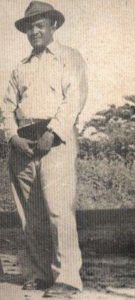
Juan Pablo Sojo
*Juan Sojo was born on this date in 1907. He was an Afro Venezuelan author and activist.
Juan Pablo Sojo was born in the town of Curiepe, Brión Municipality, Miranda State. As a youth, he had his father, Juan Pablo Sojo B, as his primary teacher. His father was a musician and compiler of festivities of African origin from his hometown and globally.
Young Sojo was self-taught and increased his academic knowledge in ethnohistory, demography, sociology, literature, and journalism. He studied the slave trade, the use of the hand subjected to slavery, and the multiple cultural contributions of Africans and their descendants in the context of abolitionism in South America. In 1930, as a columnist, he wrote in the national press. He won the Tamanaco 1943 prize with the story of social content entitled "Hereque." His novel Nochebuena Negra was widely distributed, and he also published articles in El Universal, El País, El Nacional, Ahora, and El Heraldo. Other articles were Los Grandparents de Color, Cantos Negros, and Zambo.
Writing of Spanish-American Modernism, we want to refer to the movement that began in 1888 and saw figures such as José Martí, José Asunción Silva, and others. The modernist characteristics in Sojo are especially noticeable in his poem "Chirimena/Acuarela." His writings demonstrated a fineness of style comparable to the great masters. As a playwright, he created 'The Tree That Walks' in 1945, although Canto Malembe, The Color of Love, and Santa remain unpublished. He combined oral testimonies, direct observations of cultural manifestations, and a wide consultation of written sources of prestigious foreign authors.
He did not discard the primary sources, so he made various inquiries in the General Archive of his Nation. In his investigations, he contributed knowledge about the cultivation of cocoa and the slave regime in the colony and enriched the content of his written works. Sojo emphasized his concern for nonwhite people and his struggle against an environment hostile to the descendants of slaves of African origin. In 1946, he was a member of the Venezuelan Directorate of Culture of the Ministry of Education. In early 1948, he accompanied the Cuban poet Nicolás Guillén on a tour of Barlovento during his visit to Venezuela. From there was born the poem "Luna de Barlovento" by Guillén, whom Sojo recognized as a master of Negroid poetry.
At the time of his premature death in Caracas on October 8, 1948, Juan Sojo was Head of the Literary Folklore Section of the National Folkloric Research Service. When he died, his work of interpretation and Afro Venezuelan cultural vindication was cut short since the manuscripts of his announced unpublished works disappeared without being recovered to date.